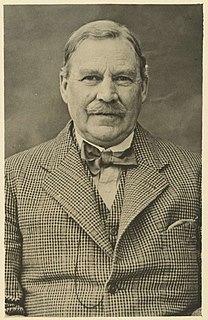
Andrew Barton "Banjo" Paterson, was an Australian bush poet, journalist and author. He wrote many ballads and poems about Australian life, focusing particularly on the rural and outback areas, including the district around Binalong, New South Wales, where he spent much of his childhood. Paterson's more notable poems include "Clancy of the Overflow" (1889), "The Man from Snowy River" (1890) and "Waltzing Matilda" (1895), regarded widely as Australia's unofficial national anthem.

The Barcoo River in western Queensland, Australia rises on the northern slopes of the Warrego Range, flows in a south-westerly direction and unites with the Thomson River to form Cooper Creek. The first European to see the river was Thomas Mitchell in 1846, who named it Victoria River, believing it to be the same river as that named Victoria River by J. C. Wickham in 1839. It was renamed by Edmund Kennedy after a name supplied by local Aborigines.

Will H. Ogilvie was a Scottish-Australian narrative poet and horseman, jackaroo, and drover, and described as a quiet-spoken handsome Scot of medium height, with a fair moustache and red complexion. He was also known as Will Ogilvie, by the pen names including 'Glenrowan' and the lesser 'Swingle-Bar', and by his initials, WHO.

Clarence Michael James Stanislaus Dennis, better known as C. J. Dennis, was an Australian poet and journalist known for his best-selling verse novel The Songs of a Sentimental Bloke (1915). Alongside his contemporaries and occasional collaborators Henry Lawson and Banjo Paterson, Dennis helped popularise Australian slang in literature, earning him the title 'the laureate of the larrikin'.

The Man from Snowy River is a 1920 film made in Australia. The film was silent and filmed in black and white, and was based on the Banjo Paterson poem of the same name. It is considered a lost film.

"Mulga Bill's Bicycle" is a poem written in 1896 by Banjo Paterson. It was originally published in the 25 July 1896 edition of the Sydney Mail, and later appeared in the poet's second poetry collection Rio Grande's Last Race and Other Verses.
Hay and Hell and Booligal is a poem by the Australian bush poet A. B. 'Banjo' Paterson who wrote the poem while working as a solicitor with the firm of Street & Paterson in Sydney. It was first published in The Bulletin on 25 April 1896. The poem was later included in Paterson's collection Rio Grande's Last Race and Other Verses, first published in 1902.
This article presents a list of the historical events and publications of Australian literature during 1897.
In Answer to Various Bards is a poem by Australian writer and poet Andrew Barton "Banjo" Paterson. It was first published in The Bulletin magazine on 1 October 1892 in reply to fellow poet Henry Lawson's poem, In Answer to "Banjo", and Otherwise.
The Poets of the Tomb is a poem by Australian writer and poet Henry Lawson. It was first published in The Bulletin magazine on 8 October 1892 in reply to fellow poet Andrew Barton "Banjo" Paterson's poem, In Answer to Various Bards.
A Voice from the Town is a poem by Australian writer and poet Andrew Barton "Banjo" Paterson. It was first published in The Bulletin magazine on 20 October 1894.
Saltbush Bill is a humorous poem by Australian writer and poet Andrew Barton "Banjo" Paterson. It was first published in The Bulletin magazine on 15 December 1894, the Christmas issue of that publication.
Saltbush Bill's Gamecock is a humorous poem by Australian writer and poet Andrew Barton "Banjo" Paterson. It was first published in Brooks's Australian Xmas Annual Volume 1 1898.
Saltbush Bill on the Patriarchs is a humorous poem by Australian writer and poet Andrew Barton "Banjo" Paterson. It was first published in The Evening News on 19 December 1903.
Saltbush Bill, J.P. is a humorous poem by Australian writer and poet Andrew Barton "Banjo" Paterson. It was first published in The Evening News on 16 December 1905.

The Man from Snowy River and Other Verses (1895) is the first collection of poems by Australian poet Banjo Paterson. It was released in hardback by Angus and Robertson in 1895, and features the poet's widely anthologised poems "The Man from Snowy River", "Clancy of the Overflow", "Saltbush Bill" and "The Man from Ironbark". It also contains the poet's first two poems that featured in The Bulletin Debate, a famous dispute in The Bulletin magazine from 1892-93 between Paterson and Henry Lawson.
A Bush Christening is a humorous poem by Australian writer and poet Andrew Barton "Banjo" Paterson. It was first published in The Bulletin magazine on 16 December 1893, the Christmas issue of that publication. It has been called "a rollicking account of how the traditional pre-occupations, whisky and religion, come together".
Rio Grande's Last Race is a racing poem by Australian writer and poet Andrew Barton "Banjo" Paterson. It was first published in the London Sketch magazine on 16 December 1896. It was later published as the title poem for Paterson's second poetry collection, Rio Grande's Last Race and Other Verses, in 1902.
Rio Grande's Last Race and Other Verses (1902) is the second collection of poems by Australian poet Banjo Paterson. It was released in hardback by Angus and Robertson in 1902, and features the poems "Rio Grande's Last Race", "Mulga Bill's Bicycle", "Saltbush Bill's Game Cock" and "Saltbush Bill's Second Fight".

Saltbush Bill, J.P., and Other Verses (1917) is the third collection of poems by Australian poet Banjo Paterson. It was released in hardback by Angus and Robertson in 1917, and features the poems "Waltzing Matilda", "Saltbush Bill, J.P.", "An Answer to Various Bards" and "T.Y.S.O.N.".









